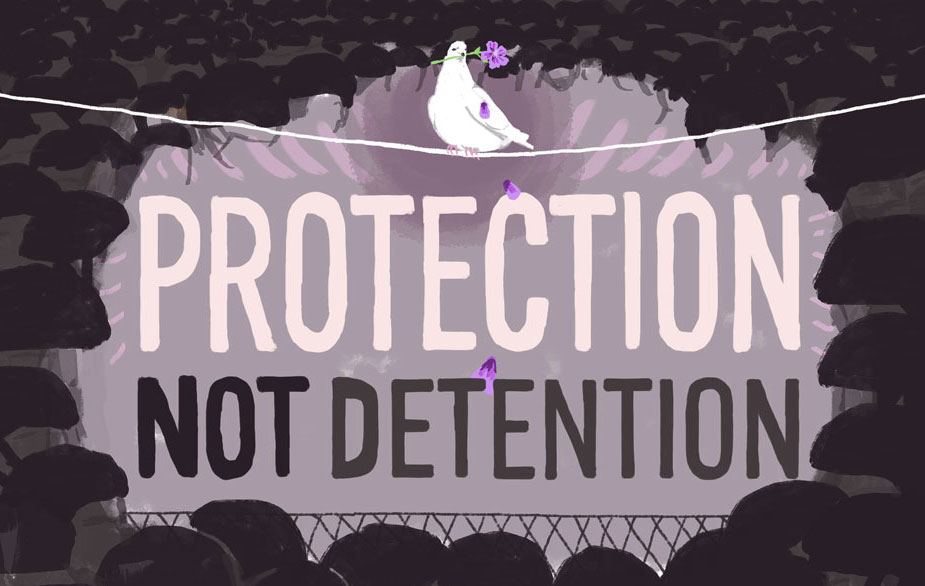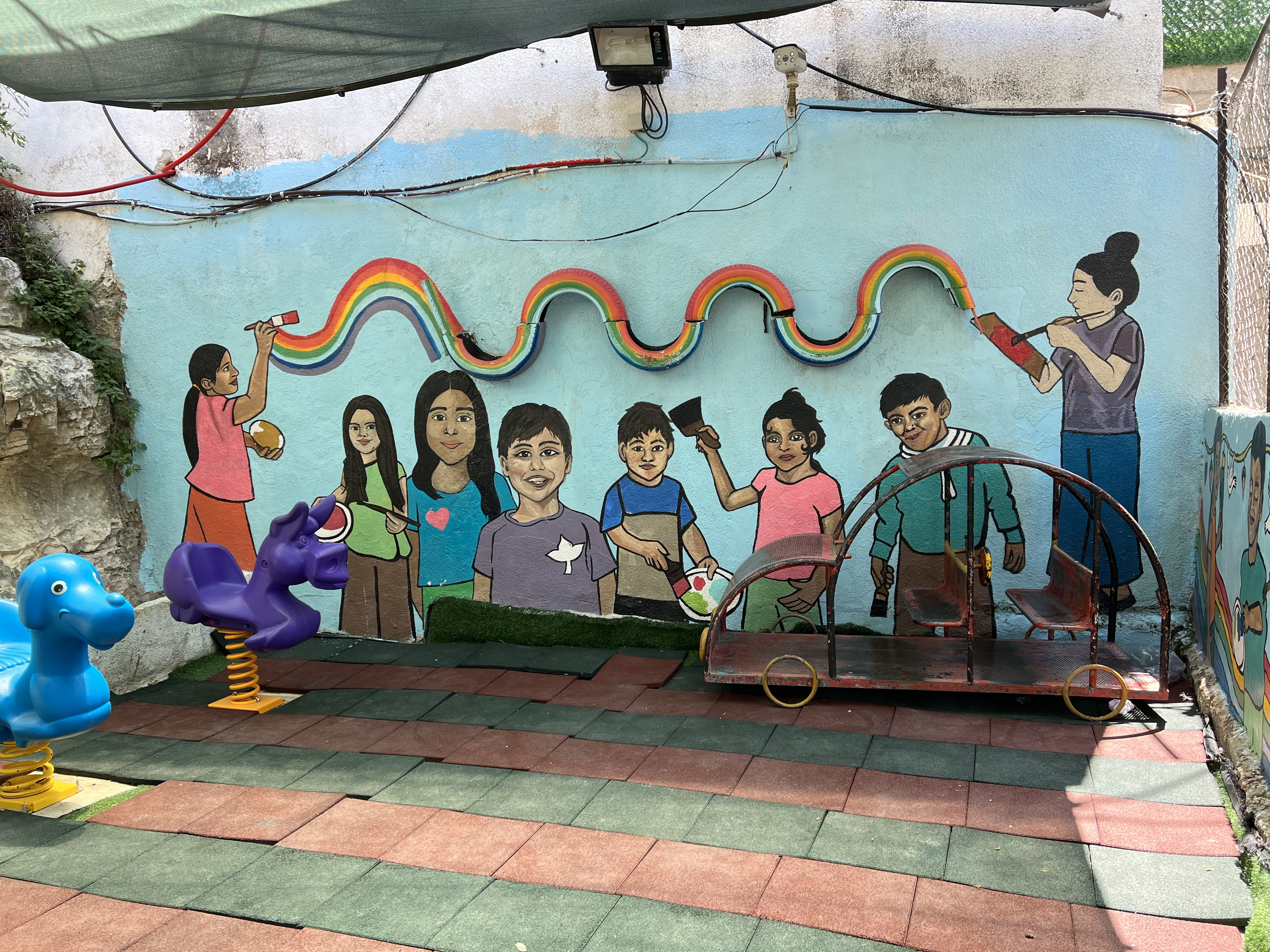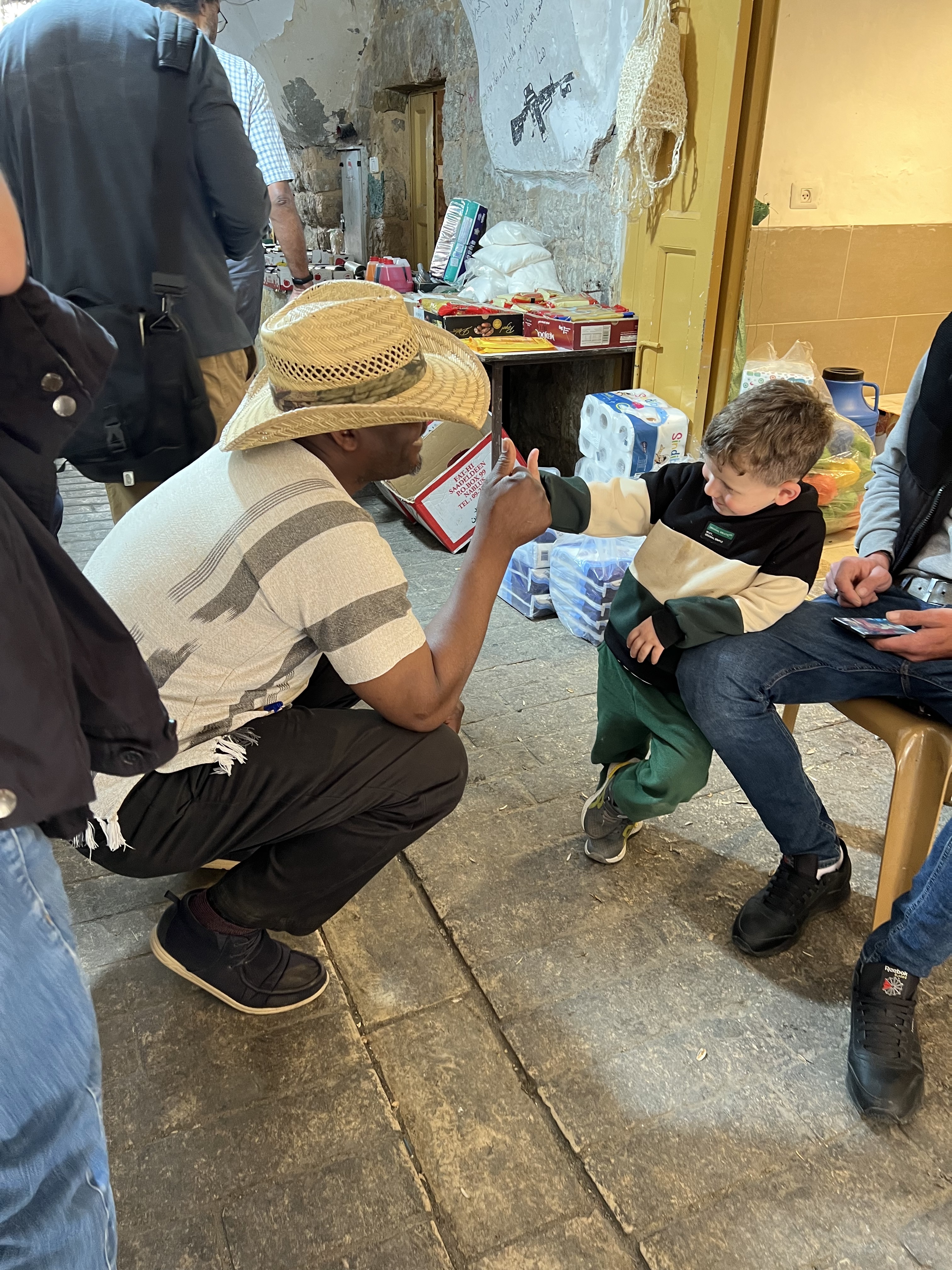
Download this poster here. Graphic: Aija Suuta
For the past seven years, AFSC has partnered with Defense for Children International-Palestine on the No Way to Treat a Child campaign. The campaign challenges Israel’s prolonged military occupation of Palestinians by exposing the widespread and systematic ill treatment of Palestinian children arrested by Israeli forces.
Our No Way to Treat a Child campaign engages policymakers in Washington, D.C. in standing up for Palestinian rights. Over the years, we have hosted congressional briefings, delivered petitions, supported legislation, and mobilized people across the country to join our advocacy through public events, webinars, and more.
We're making an impact. Since 2017, members of Congress have introduced legislation to hold Israel accountable for human rights violations against Palestinian children. On May 5, 2023, Rep. Betty McCollum (D-MN) reintroduced H.R. 3103 "Defending the Human Rights of Palestinian Children and Families Living Under Israeli Military Occupation Act" with 16 original co-sponsors in Congress. (See a full list of co-sponsors).
Like its predecessor bill introduced in 2021, H.R. 3103 (also known as the Palestinian Children and Families Act) seeks to promote justice, equality, and human rights for Palestinian children and families. The bill would prohibit Israeli authorities from using U.S. taxpayer funds to detain and torture Palestinian children, demolish and seize Palestinian homes, and further annex Palestinian land in the occupied West Bank.
Fourteen members of Congress emphasized the need for such legislation in a joint letter to the Biden administration in April 2023, which stated: "At this inflection point, we ask your administration to undertake a shift in U.S. policy in recognition of the worsening violence, further annexation of land, and denial of Palestinian rights. Only by protecting democracy, human rights, and self-determination for all Palestinians and Israelis can we achieve a lasting peace."
In its first week of introduction, H.R. 3103 was endorsed by over 75 organizations. That includes Palestinian-led organizations, faith-based organizations (including Jewish organizations and rabbinical associations), civil and human rights organizations, and progressive political parties.
You can help us keep up the momentum and build support in Congress for Palestinian rights. Through our work, we have found the following messages to be effective in talking with members of Congress about Palestinian children in Israeli military detention. Use these messages to communicate with your elected officials and advocate for Palestinian rights—whether in phone calls, emails, letters, online forums, or in person.

Mural from a child care center in the Palestinian neighborhood of Silwan. Photo: Jennifer Bing/AFSC
1. Children are the future. They also are the present.
All societies value their children and build their dreams and hopes for a better future around their youth. In the occupied Palestinian territory, where children under 18 make up nearly half of the population, this is also true. These Palestinian children are not only the future, they are also the present—and their rights are being violated when they are detained and tried in the Israeli military court system. When it comes to children—whether or not they have committed an alleged offense—international law demands that detention must be used as a measure of last resort and for the shortest amount of time. The best interests of a child must be a primary concern. But Israeli’s treatment of Palestinian children violates these laws.
2. Two sets of laws exist: one for Palestinians, another for Israelis. Even on the same land.
In the occupied West Bank, there are two separate legal systems operating in the same territory. The sole factor that determines which laws apply to a person is their nationality and ethnicity. The entire Palestinian population is subject to Israeli military law, which denies people their fundamental rights. Meanwhile Israeli settlers living in the West Bank are subject to the Israeli civilian and criminal legal system. That means no Israeli child comes in contact with the military court system.
Israel is the only country in the world that systematically prosecutes children in a military court system that lacks basic safeguards for a fair trial. Every year, between 500 and 700 Palestinian children, some as young as 12 years old, are detained and prosecuted in the military court system.
3. Abuse in the military court system is widespread, systematic, and well documented. Military courts are not about providing justice.
United Nations agencies and local and international human rights organizations—including UNICEF, Human Rights Watch, B’Tselem, Amnesty International, and Defense for Children International-Palestine—have documented the widespread, systematic, and institutionalized ill-treatment of Palestinian children arrested and detained by Israeli forces. The U.S. State Department also has documented the ill-treatment of Palestinian child detainees in its annual human rights country reports on Israel and the occupied Palestinian territory.
Three out of four children arrested experience physical violence during arrest or interrogation by Israeli soldiers. Children are often arrested in night raids on their homes—blindfolded and hand-tied, denied access to lawyers and their parents during interrogation, coerced into signing confessions, convicted in military courts, and imprisoned in detention centers, often inside Israel outside of the occupied West Bank, which makes it difficult for family to visit. Since 2016, Israeli authorities have increasingly used solitary confinement for interrogation purposes to obtain a confession or gather intelligence information from the child, a practice amounting to torture under international law.
Over 90% of Palestinian children taken to military court are convicted.

A recent delegation of AFSC staff to Palestine. Photo: Jennifer Bing/AFSC
4. The U.S. government is not a neutral player on this issue—but could make a positive difference.
U.S. military assistance to Israel has helped to sustain the military occupation and undermined the long-term security interests of both Israelis and Palestinians — and that must change. In September 2016, the U.S. agreed to give Israel $38 billion in military assistance over the next decade (fiscal years 2019-2028), the largest such aid package in U.S. history.
Realizing a just and lasting peace will require accountability. Continued U.S. military assistance to Israel will only maintain the status quo and Israel’s military occupation, including the abuse and detention of Palestinian children.
H.R. 3103 would make a difference by holding Israel accountable for violating Palestinian rights. It would require the Secretary of State to certify annually to Congress that foreign aid to Israel does not violate any of these abuses of human rights and international law. The bill would also require the Government Accountability Office to submit an annual report to Congress detailing the expenditure of U.S. taxpayer funds by Israel for "offshore procurement" and compliance with congressionally mandated requirements. The provision would ensure transparency and accountability for how Israel spends U.S. foreign aid, which Congress requires of all other countries.
In recent years, members of Congress have publicly stated their concern for the rights of Palestinian children:
- In 2015, 19 members of Congress signed a letter to then Secretary of State John Kerry, urging him to prioritize the rights of Palestinian children in the U.S. government’s bilateral relationship with Israel.
- One year later, 20 members of Congress called on President Obama to appoint a special envoy for Palestinian children.
- In January 2017, over 11,000 people signed a petition to Secretary of State Rex Tillerson, requesting the U.S. government to prioritize human rights and hold Israel accountable for its systematic ill treatment of Palestinian child detainees.
- In November 2017, Rep. Betty McCollum introduced H.R. 4391, "Promoting Human Rights by Ending the Israeli Military Detention of Palestinian Children Act," which prohibits U.S. taxpayer funds from supporting grave human rights violations against Palestinian children in the Israeli military detention system. The bill received 31 Congressional sponsors.
- In April 2019, Rep. McCollum introduced H.R. 2407, “Promoting Human Rights for Palestinian Children Living Under Military Occupation Act,” which would require that United States funds do not support military detention, interrogation, abuse, or ill-treatment of Palestinian children. The bill had 25 congressional supporters.
- In April 2021, Rep. McCollum introduced H.R. 2590, the “Defending the Human Rights of Palestinian Children and Families Living Under Israeli Military Occupation Act” seeking to ensure that no U.S. taxpayer funds are used by the Israeli government for the military detention of Palestinian children, the demolition of Palestinian homes and property, or to further annex Palestinian land in violation of international law. The bill had 33 congressional supporters.
Help us build on the momentum of our No Way to Treat a Child campaign. Join our work to end Palestinian child detention by taking action today: